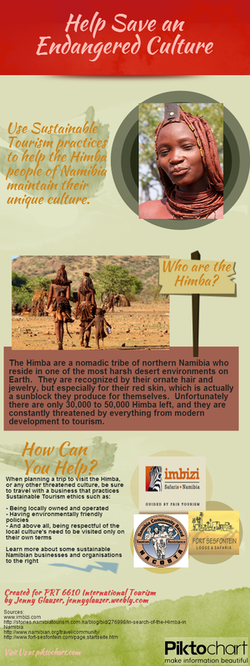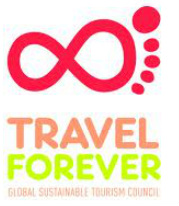
Bringing attention to the need for Sustainable Tourism practices is a great way to educate people on the responsible way to tour the world! Here is an infograph I made to display on pinterest.
|
|
 Bringing attention to the need for Sustainable Tourism practices is a great way to educate people on the responsible way to tour the world! Here is an infograph I made to display on pinterest.
0 Comments
 Imbizi is a translation of zebra. Fair Trade is a relatively new concept which promotes the rights of developing
countries to buy and sell goods at a fair price. Throughout history, especially during colonialism, the majority of wealthy northern nations have taken advantage of the less developed southern nations. This has created mass poverty and an incredible obstacle for the southern hemisphere in competing with the northern hemisphere. Fair Trade is the idea that we should buy goods not at the lowest cost possible, but from a fair assortment of small retailers at a price that does not only sustain their small business, but enable it to grow. As these small businesses are able to stake their roots and expand, the local economies of these developing nations will also grow, and hopefully become much more steady in the future. Fair Trade thus far has mostly been associated with the selling of handicrafts and certain agricultural items, but as the concept spreads, we see that it can be applied to many more markets; for my blog I would like to focus the use of Fair Trade specifically to tourism. Tourism is now a booming industry which continues to grow. In Namibia, where the endangered culture of the Himba reside, tourism has become one of the most important trades in sustaining the economy. Without Fair Trade practices however, the tourism trade will only benefit a tiny percentage of the population. That is why it is important when choosing travel experiences to find companies/local retailers who support Fair Trade. Doing minimal research on the internet I was able to find a safari company that displays those beliefs proudly. Imbizi Safaris is a company that provides safaris throughout Namibia, including a choice to visit a Himba village. Although the safari is the actual "good" that is being offered, the company seems just as devoted to being sure that they are practicing Fair Trade principals. For instance, Imbizi Safaris gives a minimum of 5% of their profits to development projects which help the local community. Along with this donation, Imbizi has declared its business philosophy along four principles: respect, fair share, sustainability and integrity. Respect includes taking care of the environment through recycling programs and a responsibility program which is designed to help tourists be eco-friendly during their visit. It also includes providing contributions to gender equality and aids/hiv awareness programs in the community. Fair Share means that Imbizi includes locally owned destinations along their routes, which are on locally owned land. This ensures that money spent in Namibia stays in the local economy, and it promotes other small businesses which in turn promotes Fair Trade. Sustainability means hiring locals before outsiders, conserving resources and even offering internships to Namibian youth. This gives great employment opportunities to locals at a fair wage, the same wage and working conditions that would be offered to an outsider (ie. American). Offering jobs with fair wages to locals is an instant boost to the economy and a way to keep money flowing within the area. Integrity means that all employees are giving the best services possible. This is important so that travelers who do choose this Fair Trade company are satisfied with the product offered and will be sure to recommend it and hopefully use Fair Trade providers in the future. Please visit the Imbizi Safari site to learn more about this particular company, and in the future be sure to look for companies who are collaborating with Fair Trade standards!  Learn more about sustainable tourism! My goal this week was to find a company offering tours through Namibia, and especially through the Himba villages, that could provide an eco/cultural-friendly experience. After reading through a few resort and safari websites, I found one company that really stood out to me as being more concerned with the native people and land, than with profits. The company, Wild Safari Africa, is ran by a former member of the Peace Corps, who spent 27 months living with a Namibian tribe while teaching their children English.
Tourism is one of the biggest economic boosters in Namibia. With few other resources in the "Oldest Desert in the World", locals have come to depend on tourists. The problem is that if sustainable tourism guidelines are not met, the beauty and wonder of Namibia, which is what brings tourists in the first place, will be a thing of the past. It is fundamentally important then that we educate each other on the importance of choosing companies whose top concern is the well being of the people and natural environment of the location we want to visit. One paragraph in particular stood out to me on the Wild Safari Africa website (www.wildsafariafrica.com), as showing the eco-friendly integrity of the company's founder, Jeremy Allen: "Wild Safari Africa makes environmental and cultural sensitivity a TOP PRIORITY to ensure the integrity of both indigenous peoples and our prestigious ecosystems. Ecotourism is an intricate design at Wild Safari Africa, with a mission to provide low impact sustainable travel, while enlightening YOU with local cultures and majestic animals." Along with providing sustainable tourism experiences, Wild Safari Africa is dedicated to donating $25 for every customer they have to Empower Women in Africa, Inc. The founder has also written guidebooks to give visitors a better understanding of the local cultures, hoping to ensure visitors will be sensitive to the needs of the Himba villagers to maintain their traditions without any unnecessary influence of the outside world. I am sharing this example of a sustainable-friendly company in hopes that readers will do their research when choosing vacation accommodations. Please be sure to take the time to find a company that is dedicated to the local people and environment; otherwise these beautiful and wondrous destinations may not be around much longer.  Himba Woman Introduction to My Blog:
This blog is going to be a representation of the research I am doing on the problem of endangered cultures, with a focus on the Himba people of Namibia. I hope to bring attention to the global issue of the narrowing of cultural diversity. Along with bringing attention to the problem, I would also like to look into possible means of cultural preservation through sustainable tourism. If like me, you worry about globalization narrowing the diversity which makes our world so interesting and beautiful, then please read on and submit your thoughts on the subject! Who are the Himba? The Himba are a unique tribe of Africa who reside in the northern part of Namibia. Their population of 20,000-50,000 people make a living mostly by raising cattle and goats. Their villages are set up in a harsh desert atmosphere, which in the past has kept them mostly isolated. The Himba are usually distinguished by their red-tinted skin, which is actually a type of sun-block they have developed and deemed beautiful. They also are known for their intricate hairstyles and leather jewelry. Why are they threatened? Throughout the last few decades, the Himba have overcome drought, war and extreme poverty; proving to be a resilient people. Now, along with many small tribes throughout the world, their way of life is currently at risk of becoming extinct. The new threat is globalization. As tourism becomes more affordable to everyone, tourist traps are being set up in once isolated areas. This means shoving tourism on the Himba tribe as a profitable venture for the Namibian government. Without regulations, which should focus on the rights of the Himba to keep their traditions alive, their world will become a thing of the past. What is a possible solution? One of the ways I believe we can stop this from occurring is to demand sustainable tourism practices in the area. The idea of sustainable tourism, versus regular tourism, is that we do not leave a footprint on the local culture and environment. This means taking special care not to influence their way of life when visiting their villages. It also means developing a tourism system that directly benefits the local community, keeping the financial profits in the economy of the people who are providing the tourism services. Summary: This is just a basic look into what I hope to research for this blog. I would like to learn more about the Himba people, and what they want their future to look like. With that knowledge I hope to help spread the word about endangered cultures, and what we as businesses, students, teachers and tourists can do to help. Sources: http://traditionscustoms.com/people/himba-people http://www.123helpme.com/view.asp?id=39906 |